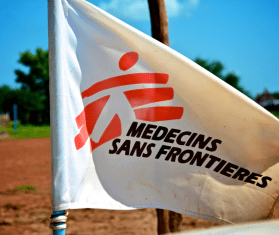This report covers MSF activities in response to COVID-19 from March through May 2020.
The COVID-19 pandemic is an unprecedented health crisis of global scale. Since early 2020, it has put tremendous strain on health care systems, disrupted economies, and radically altered social life in many countries around the world. In a race against the fast-spreading virus and in response to rapidly increasing patient numbers at the start of the year, Doctors Without Borders/Médecins Sans Frontières (MSF) began scaling up its global response from early January. MSF committed substantial resources to developing dedicated COVID-19 projects and maintaining essential health care in its existing programs.
In countries with robust health systems, MSF’s operational focus is in offering expertise in handling complex emergencies and advising on public health approaches, taking pressure off overstretched health facilities, ensuring health care workers are protected, and caring for vulnerable populations. In conflict zones, humanitarian crises, and low-resource settings with fragile health systems, MSF’s priority is to ensure that medical teams are able to provide lifesaving care and safely manage potential COVID-19 patients. MSF is also focused on maintaining or adapting crucial medical activities, including treatment for HIV and tuberculosis, measles vaccination campaigns, malaria prevention, and the fight against other infectious disease outbreaks, such as cholera or Ebola.
In March, MSF created the COVID-19 Crisis Fund, to raise urgently needed funds both for its dedicated COVID-19 programs and to mitigate the potentially severe impact on existing health services. The fund seeks to raise 150 million euros to cover direct and indirect costs related to COVID-19 over the course of 2020 and 2021. By late July, just over 99 million euros had been raised.
This report is the first in a series of accountability reports and operational snapshots offering insights into MSF’s global COVID-19 response, highlighting activities and outcomes, documenting expenditures, and exposing the challenges faced in accessing and supplying communities with essential medicines and supplies.
This report covers the period from March through May 2020, and traces some earlier activities back to the beginning of the year. It provides an account of how MSF projects around the globe have shifted gears to accelerate outbreak preparedness and adapt activities in response to the evolution of the COVID-19 pandemic (Chapter 4). The report looks at key data from MSF activities in Europe—the epicenter of the pandemic from March to late May (Chapter 5). It also discusses MSF’s approach in managing the major staffing, logistics, supply, and financial challenges of responding to COVID-19 (Chapter 6).
The second report on MSF‘s global COVID-19 response is scheduled for publication in October and will cover activities from June through August. A third report will be released in early 2021, reviewing the remaining months of the year.






